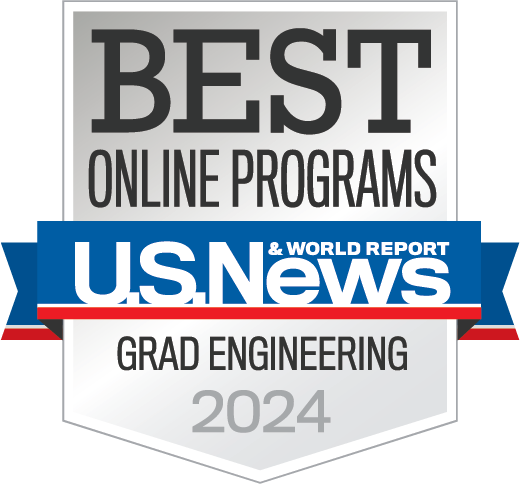100% Online
Complete your Penn State course work at your own pace and 100% online.
Application deadline
Credits and costs
Nationally Recognized

Gain Skills to Design, Develop, and Test Software
Implement new technologies in one of the fastest growing professions throughout industry and government.
Drive global innovation and technological change.
Plan and manage development of software-intensive systems using project management methods, communication skills, and tools.
Explore the trade space within a given set of internal and external constraints for a system under development.
Immerse Yourself in Software Engineering Courses
Immerse Yourself in Software Engineering Courses
Your course work will present extensive coverage of cutting-edge concepts and techniques needed by software engineers, including mobile and cloud computing, artificial intelligence, machine learning, and big data.
You can earn up to three related graduate certificates along the way to your Master of Software Engineering. Students who plan to take the stackable credentials pathway to this degree should follow the course lists for each graduate certificate program. To earn each certificate, you must apply, gain acceptance to the program, and complete the required courses.
- Software Architecture and Design (9 credits)
- Project Quality Management (9 credits)
- AI Engineering (12 credits) or Data Analytics and Engineering (12 credits)
Students who are not pursuing stackable credentials can follow the full course list for the program:
Required Courses (36 credits)
This 36-credit online program consists of 12 courses that you will complete in continuous seven-week terms over two years. The program is completed in two years by taking courses fall, spring, and summer semesters.
Year 1, Semester 1
- 3credits
Students will learn and practice the elements of constructing a large-scale distributed software system using current technologies.
- 3credits
Theory and applications of requirements elicitation, analysis, modeling, validation, testing, and writing for hardware and software systems.
Year 1, Semester 2
- 3credits
Software systems architecture; architectural design principles/patterns; documentation/evaluation of software architectures; reuse of architectural assets through frameworks/software product lines.
- 3credits
Best practices in the requirements, analysis, and design of large software systems including the Unified Modeling Language and the Unified Process.
Year 1, Semester 3
- 3credits
Analysis and construction of project plans for the development of complex software products; how to manage change and cost control.
- 3credits
This course provides a rigorous formal framework and practical information on the testing of software throughout its life cycle.
Year 2, Semesters 4 (select 6 credits) and 5 (select 6 credits)
Note: Choose 2 courses each semester. These courses are 14 weeks long, rather than the usual 7 weeks.
- 3credits
This course will cover the foundations on neural networks and deep learning networks. It covers the core concepts of deep neural networks, including the convolutional neural networks for image recognition, recurrent neural networks for sequence generation, and generative adversarial networks for image generation.
- Prerequisite
1 undergraduate course in probability or statistics.
- Note
Course available with permission.
- 3credits
This course will cover the main theory and approaches of reinforcement learning, along with deep learning and common software libraries and packages.
- 3credits
This course covers basic as well as advanced concepts to gain a detailed understanding of Natural Language Processing tasks such as language modeling, text to speech generation, natural language understanding, and natural language generation. Students can learn the necessary skills to design a range of applications, including sentiment analysis, translating between languages, and answering questions. The practical implementation of these applications with deep neural networks is also discussed.
- Prerequisite
STAT 500 and A-I 570 or DAAN 570
- Note
Course available with permission.
- 3credits
This course will teach the foundations of AI and give students a practical understanding of the field. This course gives an overview of the core concepts of AI, including the intelligent agents, knowledge and reasoning, reinforcement learning, planning and acting, belief networks, computational learning, Markov decision process, and more.
- Prerequisite
1 undergraduate course in probability or statistics.
- Note
Course available with permission.
- 3credits
This course focuses on the design of computer-based, machine vision systems using appropriate algorithms and best practices. Students will learn image representation and structuring; feature extraction and segmentation; and information extraction, filtering, and analysis.
- 3credits
Practical benefits of data mining will be presented; data warehousing, data cubes, and underlying algorithms used by data mining software.
- 3credits
Examination of large-scale data storage technologies including NoSQL database systems for loosely-structured data, and warehouses for dimensional data.
- 3credits
This course will explore the development of analytics systems and the application of best practices and established software design principles using the Python programming language and its several toolkits.
- Note
Requires previous undergraduate probability and statistics course and is available with permission.
- 3credits
This course provides a foundation in the principles, concepts, techniques, and tools for visualizing large data sets.
- 3credits
Survey course on the key topics in predictive analytics. Students will learn methods associated with data analytics techniques and apply them to real examples using the R statistical system.
- Prerequisite
1 undergraduate course in probability or statistics.
- Note
Course available with permission.
- 3credits
The requirements capture, design, and development of relational database applications; analysis of business requirements and development of appropriate database systems.
- 3credits
A web-centric look at the latest techniques and practices in computer security as they apply to the internet.
- 3credits
Descriptive statistics, hypothesis testing, power, estimation, confidence intervals, regression, one- and 2-way ANOVA, Chi-square tests, diagnostics.
- 3credits
Design and development of mobile computing-based applications and services utilizing current and emerging mobile computing technologies. Provides students with an advanced and hands-on exploration of mobile computing paradigms.
Year 2, Semester 6
- 6credits
The 800-level studio provides an opportunity for students to undertake a substantial software project.
Course Availability
If you're ready to see when your courses will be offered, visit our public LionPATH course search (opens in new window) to start planning ahead.
Advance Your Software Engineering Career

Advance Your Software Engineering Career
Is a master’s in software engineering worth it? You can use the knowledge gained from this online program and the support of Penn State career resources to pursue software engineering positions in a variety of fields, depending on your goals.
Job Titles Related to This Degree
The following roles are often held by people with this type of degree:
- Software Development Director
- Software Development Engineer
- Software Project Manager
- Software Quality Assurance Engineer (SQA Engineer)
- Solutions Architect
Employment Outlook for Occupational Fields Related to This Degree
Estimates of employment growth and total employment are provided by the U.S. Bureau of Labor Statistics and are subject to change. While these occupations are often pursued by graduates with this degree, individual outcomes may vary depending on a variety of factors. Penn State World Campus cannot guarantee employment in a given occupation.
Software Developers
Computer and Information Systems Managers
Software Quality Assurance Analysts and Testers
Career Services to Set You Up for Success

From the day you're accepted as a student, you can access resources and tools provided by Penn State World Campus Career Services to further your career. These resources are beneficial whether you're searching for a job or advancing in an established career.
- Opportunities to connect with employers
- Career counselor/coach support
- Occupation and salary information
- Internships
- Graduate school resources
Ready to Learn More?
Get the resources you need to make informed decisions about your education. Request information on this program and other programs of interest by completing this form.
Ready to take the next step toward your Penn State master's degree?
Costs and Financial Aid
Costs and Financial Aid
Learn about this program's tuition, fees, scholarship opportunities, grants, payment options, and military benefits.
Costs and Financial Aid
Graduate Tuition
Graduate tuition is calculated based on the number of credits for which you register. Tuition is due shortly after each semester begins and rates are assessed every semester of enrollment.
2024–25 Academic Year Rates
| How many credits do you plan to take per semester? | Cost |
|---|---|
| 11 or fewer | $1,027 per credit |
| 12 or more | $12,325 per semester |
2025–26 Academic Year Rates
| How many credits do you plan to take per semester? | Cost |
|---|---|
| 11 or fewer | $1,037 per credit |
| 12 or more | $12,448 per semester |
Financial Aid and Military Benefits
Some students may qualify for financial aid. Take the time to research financial aid, scholarships, and payment options as you prepare to apply. Federal financial aid may only be used to pay for credits used to satisfy program requirements.
Military service members, veterans, and their spouses or dependents should explore these potential military education benefits and financial aid opportunities, as well.
Additional Cost of Attendance Details
To view the detailed list of cost of attendance elements:
- visit the Tuition Information site
- click the plus sign to expand the table
- select a semester from the World Campus row
Technical Requirements
Review the technical requirements for this program.
Note about additional hardware: It is a requirement for this online program that students have ready access to a document scanner that allows for the creation of PDF files, which will enable students to submit handwritten homework and exams in several of the mathematics-based courses.
Earn Stackable Credentials on the Way to Your Degree

Earn Stackable Credentials on the Way to Your Degree
Earn graduate certificates while you work toward your degree. It’s a great way to quickly gain new skills and add valuable credentials to your résumé — without any additional course work, course fees, or application fees.
Finish the following three certificate requirements and the 6-credit capstone course, and you will have completed the requirements to earn your Software Engineering master's degree. Please note you must apply and be accepted to each program on an individual basis, but you will not be charged application fees for any program beyond the first.
Complete Both of These Certificates (18 credits)
This online software engineering certificate can provide you the knowledge and skills needed to analyze, architect, design, implement, and manage the technical aspects of large-scale software system development.
Learn more about the Graduate Certificate in Software Architecture and DesignThis online software engineering certificate focuses on knowledge and skills needed for project management, requirements engineering, and software testing.
Learn more about the Graduate Certificate in Project Quality ManagementComplete One of These Certificates (12 credits)
In this online AI engineering certificate, you can learn to design, build, and maintain machine learning and natural language models while honing your programming skills.
Learn more about the Graduate Certificate in AI EngineeringIn this online data analytics and engineering program, you can learn to design, build, and maintain large-scale data infrastructure as well as program for data modeling, integration, warehousing, and analysis.
Learn more about the Graduate Certificate in Data Analytics and EngineeringComplete the Capstone Course (6 credits)
After the certificate requirements have been met, you just need to complete the 6-credit capstone course to finish the master's.
Benefit from Being Part of a Cohort
From start to finish, you’ll progress through the program with others in your cohort. You’ll gain valuable experience interfacing, collaborating, and networking with peers and faculty while completing projects remotely, just as teams do in the broader global marketplace.
Who Should Apply?
The Master of Software Engineering program is designed to help students with an undergraduate degree in computer science, computer engineering, electrical engineering, or information sciences become leaders in the industry.
Complete Your Degree in Two Years

Complete Your Degree in Two Years
Students in this cohort-based program will work closely with a group of peers to complete all course requirements within two years.
This degree consists of 12 courses, which you will complete in continuous seven-week terms over a two-year period. The course work is designed so that working professionals can continue to work full-time while earning their master's degrees. Maximum flexibility is maintained by the online master’s degree program in an effort to meet both the professional and personal needs of individual students and academic quality standards.
Convenient Online Format
This program's convenient online format gives you the flexibility you need to study around your busy schedule. You can skip the lengthy commute without sacrificing the quality of your education and prepare yourself for more rewarding career opportunities without leaving your home.
A Trusted Leader in Online Education

Penn State has a history of more than 100 years of distance education, and World Campus has been a leader in online learning for more than two decades. Our online learning environment offers the same quality education that our students experience on campus.
Information for Military and Veterans

Are you a member of the military, a veteran, or a military spouse? Please visit our military website for additional information regarding financial aid, transfer credits, and application instructions.
How to Apply to Penn State

How to Apply to Penn State
Apply by November 15 to start January 13
Application Instructions
Deadlines and Important Dates
Complete your application and submit all required materials by the appropriate deadline. Your deadline will depend on the semester you plan to start your courses.
Spring Deadline
Apply by November 15 to start January 13Summer Deadline
Apply by April 15 to start May 6Fall Deadline
Apply by July 15, 2025, to start August 25, 2025
Steps to Apply
For admission to the J. Jeffrey and Ann Marie Fox Graduate School, an applicant must hold either (1) a baccalaureate degree from a regionally accredited U.S. institution or (2) a tertiary (postsecondary) degree that is deemed comparable to a four-year bachelor's degree from a regionally accredited U.S. institution. This degree must be from an officially recognized degree-granting institution in the country in which it operates.
The program requires an undergraduate degree in engineering, physics, mathematics, computer science, or information science. Students from other undergraduate majors with extensive work experience in the software engineering field may be considered. The admissions committee will consider the academic background, as evidenced by the transcript, as part of the overall application.
All applicants are expected to have earned a junior/senior grade-point average of 3.0 or higher.
You will need to upload the following items as part of your application:
Official transcripts from each institution attended, regardless of the number of credits or semesters completed. Transcripts not in English must be accompanied by a certified translation. If you are a Penn State alum, you do not need to request transcripts for credits earned at Penn State but must list Penn State as part of your academic history.
Test Scores — GRE/GMAT scores are not required and will not be reviewed.
English Proficiency — The language of instruction at Penn State is English. With some exceptions, international applicants must take and submit scores for the Test of English as a Foreign Language (TOEFL) or International English Language Testing System (IELTS). Minimum test scores and exceptions are found in the English Proficiency section on the Fox Graduate School's "Requirements for Graduate Admission" page. Visit the TOEFL website for testing information. Penn State's institutional code is 2660.
References (2) — You will need to initiate the process through the online application by entering the names, email addresses, and mailing addresses of the two references. Upon submission of your application, an email will be sent to the recommender requesting they complete a brief online recommendation regarding your commitment for success in an online program. Please inform the recommender they must submit the form in order for your application to be complete.
Program-Specific Questions/Materials
Résumé — Upload a one- to two-page résumé highlighting your full-time employment and/or military experience to the online application.
Statement of Intent (one page) — Outline personal career goals and reasons for wanting to enroll in the program. This statement should be specific and include information about short- and long-term goals and how enrolling in the program may help achieve them. The statement of intent also offers applicants the opportunity to demonstrate writing and communication skills, specify examples of leadership, and provide pertinent information that will assist the committee in selecting candidates who can benefit from and contribute to the software engineering program.
To begin the online application, you will need a Penn State account.
Create a New Penn State Account
If you have any problems during this process, contact an admissions counselor at [email protected].
Please note: Former Penn State students may not need to complete the admissions application or create a new Penn State account. Please visit our Returning Students page for instructions.
Stackable Credentials Application Fee Waiver
If you have been previously accepted to a program with stackable credentials, you will not be charged an additional application fee for any associated programs.
Associated programs in the software engineering stack:
Degree
- Master of Software Engineering
Certificates
- Graduate Certificate in AI Engineering
- Graduate Certificate in Data Analytics and Engineering
- Graduate Certificate in Project Quality Management
- Graduate Certificate in Software Architecture and Design
If you begin with a certificate and are interested in pursuing the Master of Software Engineering, work with your adviser while completing your first certificate to determine which program to apply to next.
Up to 15 credits earned in any of these certificate programs may be transferred to the master's degree in software engineering, subject to restrictions outlined in GCAC-309 Transfer Credit.
You can begin your online application at any time. Your progress within the online application system will be saved as you go, allowing you to return at any point as you gather additional information and required materials.
- Choose Enrollment Type: "Degree Admission"
- Choose "WORLD CAMPUS" as the campus
Checking Your Status
You can check the status of your application by using the same login information established for the online application form.6. Complete the application.
Admissions Help
If you have questions about the admissions process, contact an admissions counselor at [email protected].
Contact Us

Contact Us
Have questions or want more information? We're happy to talk.
To learn more about the Master of Software Engineering, please contact:
For general questions about the program:
Dr. Amanda Neill
[email protected]
For general questions about Penn State World Campus:
World Campus Admissions Counselors
Phone: 814-863-5386
[email protected]
Learn from the Best
Learn from the Best
The Master of Software Engineering is offered in partnership with the Penn State Great Valley School of Graduate Professional Studies.
Faculty
Adrian S. Barb
- DegreePh.D., Computer Science, University of Missouri
- DegreeMBA, Finance and Management Information Systems, University of Missouri
- DegreeB.S., Industrial Engineering, University of Bucharest
Dr. Adrian S. Barb, associate professor of information science, teaches databases, data mining, and big data courses. He has worked as a database programmer analyst as well as a web developer at University of Missouri. His research interests include data mining, knowledge discovery in databases, knowledge representation and exchange in content-based retrieval systems, semantic modeling and retrieval, conceptual change, ontology integration, and expert-in-the-loop knowledge generation and exchange.
Mohamad Darayi
- DegreePh.D., Industrial and Systems Engineering, University of Oklahoma
- DegreeM.S., Industrial Engineering, Tarbiat Modares University
- DegreeB.S., Industrial Engineering, University of Tabriz
Dr. Mohamad Darayi, assistant professor of systems engineering, focuses his principal research and key publications on infrastructure network resilience and simulation modeling applications in health care, manufacturing, and supply chain management. He teaches courses in system simulation, risk analysis, network modeling, and data analytics.
Joanna F. DeFranco
- DegreePh.D., Computer and Information Science, New Jersey Institute of Technology
- DegreeM.S., Computer Engineering, Villanova University
- DegreeB.S., Electrical Engineering and Math, Penn State
Dr. Joanna F. DeFranco is an assistant professor of software engineering. She has worked as an electronics engineer for the Navy and as a software engineer at Motorola. Her research interests include software engineering teams, effective teamwork, Internet of Things, and software-intensive critical systems.
Everton Tavares Guimaraes
- DegreePh.D., Software Engineering, Pontifical Catholic University of Rio de Janeiro
- DegreeM. S., Computing and Systems, Federal University of Rio Grande do Norte
- DegreeB.S., Information Technology, Federal Institute of Education, Science, and Technology
Everton Tavares Guimaraes is an assistant professor specializing in software engineering. He teaches algorithms, programming, software development, architecture, and mobile computing. For a decade, he has partnered with companies domestically and internationally. His research focuses on empirical software engineering, software quality (e.g., maintenance and evolution), technical debt, AI techniques, and mobile software engineering.
Phillip A. Laplante
- DegreePh.D., Computer Science, Stevens Institute of Technology
- DegreeM.B.A., University of Colorado
- DegreeM.Eng., Electrical Engineering, Stevens Institute of Technology
- DegreeB.S., Systems Planning and Management, Stevens Institute of Technology
Dr. Phillip A. Laplante is a professor of software and systems engineering. He has an extensive list of publications and deep practical experience in requirements engineering, development, testing, and project management for a variety of complex systems, including safety critical and embedded ones. He is widely recognized for work in real-time systems, real-time imaging, and applications in the Internet of Things. He is also a pioneer in licensing of software engineers, having led the development and acceptance of the first licensure exam for software engineers in the United States.
Colin Neill
- DegreePh.D., Software and Systems Engineering, University of Wales Swansea
- DegreeM.Sc., Communications Systems, University of Wales Swansea
- DegreeB.Eng., Electrical Engineering, University of Wales Swansea
Dr. Colin Neill is a professor of software engineering and systems engineering. He teaches many courses in software and systems engineering and project management. He is the author of more than 80 articles on the development and evolution of complex software and systems and their management and governance. Dr. Neill is a senior member of the IEEE and a member of INCOSE, and he serves as associate editor-in-chief of Innovations in Systems and Software Engineering.
Robin G. Qiu
- DegreePh.D., Industrial Engineering, Penn State
- DegreePh.D., (Minor), Computer Science, Penn State
- DegreeM.S., Numerical Control, Beijing Institute of Technology, China
- DegreeB.S., Mechanical Engineering, Beijing Institute of Technology, China
Dr. Robin G. Qiu is a professor of information science at Penn State. He teaches courses on data analytics, information science, software engineering, and cyber security. Dr. Qiu's research includes smart service systems, IoT, big data, data/business analytics, information systems and integration, supply chain and industrial systems, and analytics. He served as the editor-in-chief of INFORMS Service Science. He is an associate editor of IEEE Transactions on Systems, Man, and Cybernetics and IEEE Transactions on Industrial Informatics, and has more than 160 publications.
Dusan Ramljak
- DegreePh.D., Computer and Information Sciences, CST, Temple University
- DegreeM.Sc. and B.Sc., Electrical Engineering - Systems Control, University of Belgrade, Serbia
Dr. Dusan Ramljak, assistant teaching professor of information science, teaches courses on information science, data science, storage systems, and emerging technologies. He has been applying data science on storage systems in NSF IUCRC projects with HPE, Dell, Huawei, and other companies and has more than 20 years of system administration experience facilitating business and research in the U.S., Portugal, and Serbia. His research interests include solving challenging storage systems, provenance, and caching problems, and developing and integrating distributed and parallel data mining and statistical learning technology for an efficient knowledge discovery at large sequence and temporal databases.
Sally Sue Richmond
- DegreeM.S., Information Science, Penn State
- DegreeB.A., Art, Penn State
Sally Sue Richmond is an instructor in information science. She worked as an IT professional for more than 20 years prior to teaching. Her research interests include human-computer interaction, engineering education, and teams.
Raghvinder S. Sangwan
- DegreePh.D., Computer and Information Sciences, Temple University
- DegreeM.S., Computer Science, West Chester University
- DegreeB.S., Genetics and Plant Breeding, Haryana Agricultural University
Dr. Raghvinder S. Sangwan is a professor of software engineering with expertise in the analysis, design, and development of large-scale, software-intensive systems and the use of AI engineering to design and develop intelligent systems that are safe, secure, and trustworthy. His research focuses on the improvement of these practices, and he has taught related courses to engineers and project managers at many prestigious academic, government, and industry organizations worldwide. Dr. Sangwan actively consults for Siemens Corporate Technology in Princeton, New Jersey, and holds a visiting scientist appointment at the Software Engineering Institute at Carnegie Mellon University in Pittsburgh, Pennsylvania. He is a distinguished contributor and senior member of IEEE and a senior member of ACM.
Satish Srinivasan
- DegreePh.D., Information Technology, University of Nebraska at Omaha
- DegreeM.S., Industrial Engineering and Management, Indian Institute of Technology, Kharagpur
- DegreeB.S., Information Technology, Bharathidasan University
Dr. Satish Srinivasan is an associate professor of information science in the engineering division at Penn State Great Valley. He teaches courses related to database design, data mining, data collection and cleaning, design and implementation of predictive analytics system, network and web securities, and business process management. His research interests include social network analysis, data mining, machine learning, big data and predictive analytics, and bioinformatics.
News

